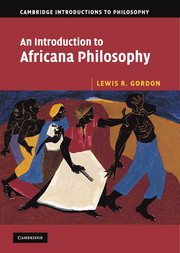Book contents
- Frontmatter
- Contents
- Preface
- Introduction: Africana philosophy in context
- Part I Groundings
- Part II From New World to new worlds
- 3 Three pillars of African-American philosophy
- 4 Africana philosophical movements in the United States and Britain
- 5 Afro-Caribbean philosophy
- 6 African philosophy
- Conclusion
- Guide to further reading
- Index
4 - Africana philosophical movements in the United States and Britain
Published online by Cambridge University Press: 05 June 2012
- Frontmatter
- Contents
- Preface
- Introduction: Africana philosophy in context
- Part I Groundings
- Part II From New World to new worlds
- 3 Three pillars of African-American philosophy
- 4 Africana philosophical movements in the United States and Britain
- 5 Afro-Caribbean philosophy
- 6 African philosophy
- Conclusion
- Guide to further reading
- Index
Summary
Africana philosophy in North America and Europe is primarily a tale of struggles in the United States and Britain. Although there is a contingent whose academic credentials were acquired at Canadian universities, no Africana philosophical movement has developed there. The creative work in the anglophone world is read through the lens of the United States, which is often presupposed by the term “African America.” I will therefore focus this discussion on African America in dialogue with Britain. It should be borne in mind that the thought discussed in this context is multinational, which is a continued legacy from the nineteenth century. The approaches include pragmatism and prophetic pragmatism, analytical philosophy, Afro-feminism, Afrocentrism, Afro-postmodernism, Afro-poststructuralism, African-American existentialism and phenomenology.
There is much debate over the genealogical location of African-American pragmatism. Because of their association with William James, perhaps the most vociferous proponents of all the classical US pragmatists, W. E. B. Du Bois and Alain Locke (1886–1954) are often associated with pragmatism. It was my contention in the section on Du Bois that he was an independent thinker whose focus on consciousness suggests a more phenomenological and dialectical reading than is often afforded in the pragmatist tradition, which focuses more on experience. Some scholars contend that Du Bois had a pragmatist strain in his efforts at historical social transformation, as Cornel West argues.
- Type
- Chapter
- Information
- An Introduction to Africana Philosophy , pp. 91 - 156Publisher: Cambridge University PressPrint publication year: 2008



